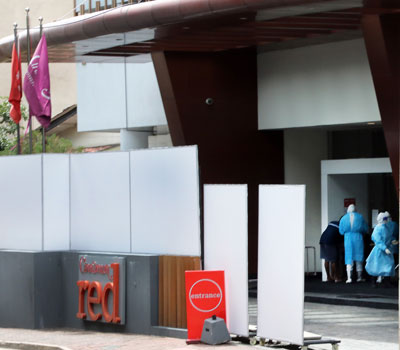News
Hotels turn to upmarket patient care, fine dining becomes takeaway
The hotel industry, hard hit by the series of pandemic lockdowns, has shown resilience by transforming business activities to patient care.
In the absence of tourist arrivals, many hotels have registered themselves as Intermediate Patient Care Centres (IPCC), providing care and comfort to patients who can afford the cost.
Some 55 hotels have turned themselves into quarantine centres to provide accommodation to asymptomatic patients and those mildly affected by the disease.

A Colombo hotel which is now an intermediate care cente
The Hotels Association of Sri Lanka said about 45 of its members in the Western Province have converted their hotels to IPCC.
The association’s President, Sarath Ukwatte, said hotels provide more than 4,000 beds for patients at a time when hospitals cannot cope with the influx of patients. With the number of patients rising daily, even private hospitals are unable to keep up with the demand for beds.
Many people, Mr. Ukwatte said, are opting to use this facility as hotels give space and privacy that cannot be obtained in public hospital wards.
“We are happy to participate in the health care process in this time of need,” he said.
This avenue is not for everyone, hoccccccccwever, as hotel patient care comes with a price.
The rooms cost Rs. 17,000 for a single room, Rs.19,000 for twin-share and Rs. 24,000 for three persons.
The hotels have partnered with private hospitals designated by the COVID-19 Task Force to manage the patients’ health concerns. The hotels provide only food lodging and housekeeping.
The income from patients is being shared between the two entities.
Mr. Ukwatte pointed out that managing rooms for sick people was expensive.
“We have to sanitise the rooms daily, use PPE equipment and dispose of all masks and other apparatus in keeping with health protocols,” he said.
“This is off-peak season. We are hopeful for [normal business to resume] in the peak season from November to April, by which time most of us will have been vaccinated and ready to go back to normal life,” he said.
While star hotels have, to some extent, transcended the problems caused by the dive in tourist numbers, many hotels and restaurants have been badly affected. The Colombo City Restaurants Collective Association said repeated lockdowns over the past 18 months has seen many workers losing their jobs.
The association, which has about 58 members, said many workers have been laid off and others have dropped out of jobs due to travel bans during lockdowns.
Noted restaurateur Harpo Gooneratne said even if matters improve most workers cannot return to work as they are under 30 years of age.
He observed that many eateries are tiding over the period by delivering food to households using delivery services.
“They are using social media to offer ‘bundle deals’ for four to six persons,” he added.
He was hopeful of an improvement in trade next month when most citizens would be vaccinated.
The government has promised to have at least 70 per cent of the population vaccinated by mid-September.
The Colombo City Hoteliers Association, which has about 35 small and medium-sized restaurants as members, said many enterprises had been driven to bankruptcy.
“Nobody walks in. Most of us survive by delivering food to people’s doorsteps. The government has to support us,” association President Shantha Kumar said.
Meanwhile, enterprising housewives have begun offering home-made lunch parcels to citizens in lockdown.
A housewife who started the business during the second wave is now overwhelmed with orders from office workers and elderly persons who are unable to cook for themselves.
The home chef, who asked for anonymity, said she hopes to continue the business even after the country returns to normal.

